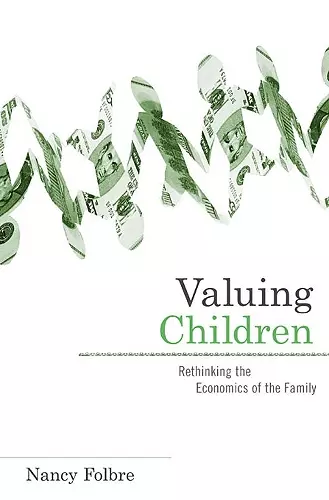Valuing Children
Rethinking the Economics of the Family
Format:Paperback
Publisher:Harvard University Press
Published:14th Apr '10
Should be back in stock very soon

An excellent analysis of economics and family policy. Folbre develops a new way of thinking about the economics of child rearing, that of treating children as an investment rather than a consumption good. Although Folbre characterizes her approach as institutional economics, she has really added to a wide variety of economic fields beyond that. -- Sheila Kamerman, Columbia University School of Social Work This book will become a standard reference work on many of the issues dealing with parenting and the production of valued goods and services. It is encyclopedic in its coverage and exceptionally well referenced. -- Samuel Preston, University of Pennsylvania
While parents spend significant time as well as money on children, most estimates of the "cost" of children ignore the value of this time. Folbre provides a startlingly high but entirely credible estimate of the value of parental time per child by asking what it would cost to purchase a comparable substitute for it.
Nancy Folbre challenges the conventional economist's assumption that parents have children for the same reason that they acquire pets--primarily for the pleasure of their company. Children become the workers and taxpayers of the next generation, and "investments" in them offer a significant payback to other participants in the economy.
Yet parents, especially mothers, pay most of the costs. The high price of childrearing pushes many families into poverty, often with adverse consequences for children themselves.
Parents spend time as well as money on children. Yet most estimates of the "cost" of children ignore the value of this time. Folbre provides a startlingly high but entirely credible estimate of the value of parental time per child by asking what it would cost to purchase a comparable substitute for it.
She also emphasizes the need for better accounting of public expenditure on children over the life cycle and describes the need to rethink the very structure and logic of the welfare state. A new institutional structure could promote more cooperative, sustainable, and efficient commitments to the next generation.
An excellent analysis of economics and family policy. Folbre develops a new way of thinking about the economics of child rearing, that of treating children as an investment rather than a consumption good. Although Folbre characterizes her approach as institutional economics, she has really added to a wide variety of economic fields beyond that. -- Sheila Kamerman, Columbia University School of Social Work
This book will become a standard reference work on many of the issues dealing with parenting and the production of valued goods and services. It is encyclopedic in its coverage and exceptionally well referenced. -- Samuel Preston, University of Pennsylvania
In this capstone work, Folbre, long a critic of the neoclassical economics approach to the family, adumbrates arguments regarding what is wrong with how economists and governments conceptualize and measure the workings of the family, using children as her fulcrum. Children reside at the intersection of family and the state, the marketplace, and the past and future. Benefit-cost accounting of children is woefully inadequate, and society lacks consensus regarding who actually bears costs; what impacts private and public expenditures have on child outcomes; what optimal expenditures might be; and what cost-benefit apportionment rubric stakeholders should employ. Folbre systematically addresses questions surrounding the value of children. Although some answers will not surprise, her unpacking of time, goods, and federal and state program costs and benefits both informs and provokes new thinking. The critical question is, who should pay for kids? The payees and benefit claimants are parents, earlier and subsequent familial generations, children themselves, and society via its government. What should hold these disparate groups together, Folbre implores, is the notion of moral obligation. Would that her vision becomes reality. -- D. J. Conger * Choice *
Folbre...shows why universal childcare should be the ultimate feminist issue. By focusing on the numbers in a new way, Folbre's Valuing Children has the most potential for reframing the debate. She may have the cool eye of an economist, but she strips the need to care for all children of its cultural baggage. -- Martha Nichols * Women's Review of Books *
- Nominated for William J. Goode Book Award 2009
ISBN: 9780674047273
Dimensions: unknown
Weight: unknown
248 pages